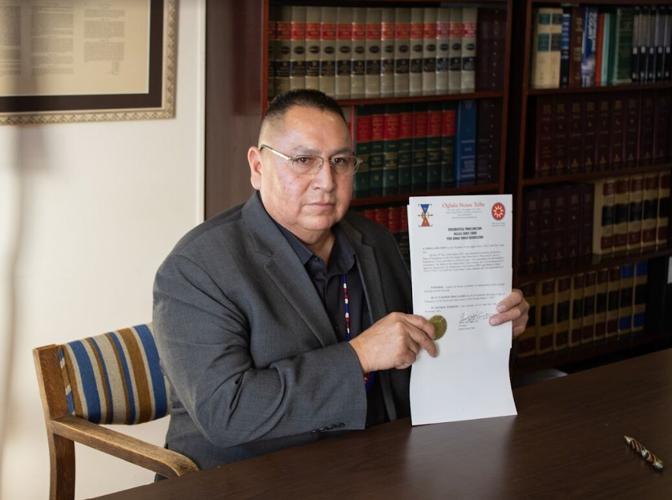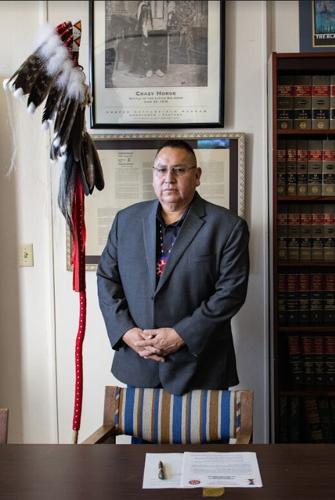It has been a year-and-a-half since the Oglala Sioux Tribe sued the United States due to a breakdown of law and order on the Pine Ridge Reservation. Continued reports of drug-related offenses, assaults and homicides prompted the tribal government to take further action.
Oglala Sioux Tribe President Frank Star Comes Out signed a new proclamation on Nov. 18 declaring a State of Emergency on the Pine Ridge Indian Reservation. The new State of Emergency declaration will remain in effect until Jan. 1, 2025.
“A State of Emergency exists on the Reservation due to the failure of the United States Government and its agencies, particularly the DOI and BIA, to honor their treaty trust and statutory obligations to the Oglala Sioux Tribe,” President Star Comes Out’s proclamation read.

Oglala Sioux Tribe President Frank Star Comes Out signed into effect a State of Emergency Proclamation on November 18.
The reservation is currently experiencing high rates of murder, suicide, drug offenses, robbery, rape, aggravated assault, burglary and missing and murdered Indigenous women, according to tribal officials.
Despite making up roughly 2% of the South Dakota population, Pine Ridge citizens account for 10% of the currently missing people in South Dakota.
The South Dakota Missing Person’s Clearinghouse reports 13 people currently missing from Pine Ridge, six of whom went missing this year and four within the past month. Seven of the total missing individuals are minors.
In July 2022, the tribe launched a lawsuit against the United States arguing the government has failed to uphold its treaty obligation of protecting the tribe. The lawsuit references several historical documents that define the United States’ obligation.
The Treaties of 1825, 1851 and 1868 all included clauses that state the United States is responsible for protecting the Oglala Sioux Tribe and its members from “bad men."
In 1877, after the confiscation of seven million acres from the former Great Sioux Reservation, the United States also promised compensation in the form of necessary aid and protection, according to treaty documents.
“The BIA has a responsibility to help our people, and I don’t see that happening here,” Oglala Sioux Tribe President Frank Star Comes Out said during a press conference Saturday. “This is an emergency. What’s being done now while we’re waiting [for litigation]?”

The Oglala Sioux Tribe said that a breakdown of law and order related to unfulfilled treaty obligations has led to an increased rate of violent crime on the Pine Ridge Reservation.
In 2021, the tribe said the federal government only provided 13% of the tribe’s requested law enforcement and criminal investigations funding for the fiscal year 2023 budget. The tribe said it only has enough funding for 33 police officers.
OST currently has 32 officers on staff, with between five and six officers working at one time. Those few are responsible for patrolling the 3.1 million acre reservation and all nine districts.
The Nov. 18 Emergency Proclamation urges President Joe Biden to intervene and direct Secretary of the Interior Deb Haaland to request sufficient funds for public safety on the reservation. This would include enough funding for the BIA standard of 2.8 officers per 1,000 persons in the service population.
The proclamation also calls for South Dakota Senators John Thune and Mike Rounds, along with Congressman Dusty Johnson, to hold field hearings on the lack of adequate law enforcement on South Dakota reservations.
While census records indicate nearly 20,000 residents on Pine Ridge, the Oglala Sioux Tribe's total enrollment number is over 54,000 people. The tribe is requesting enough funding for 120 officers.
“We don’t live in Indian country, we survive,” Star Comes Out said. “We have been patiently trying to cooperate with the government, and we feel that they’re stalling. It’s hurting our tribe and it’s hurting our people.”
As of Aug. 15, both parties in the lawsuit were supposed to begin discussing the possibility of a settlement, per U.S. District Court for the State of South Dakota Chief Justice Roberto Lange’s order. There has been no movement since that order.
Pine Ridge residents face the realities of life with limited law enforcement every day, OST officials explained.
Officers often have to prioritize which calls they respond to, leaving many waiting hours for help — if help ever comes. Some individuals have reported waiting three or four hours for a response, according to the tribe.
“The trust is not there anymore; the people don't feel safe anymore,” Star Comes Out said. “If you’re wondering what a lack of treaty fulfillment looks like, just go to our reservation and see for yourself.”
Tribal entities such as Oglala Victim Services supported the call for a State of Emergency. On Nov. 16, the organization held a vigil for murdered tribal members and called for an end to drug-related violence.
Victim Services said it will continue hosting weekly vigil walks until something is done about violence on the reservation.
The Nov. 18 proclamation isn’t the first time that a State of Emergency has been issued on Pine Ridge in response to violence. The tribe has authorized several declarations over the past seven years.
“We’re living in a lawless government; we’re impoverished and we don’t have the resources to combat [the violence],” tribal council representative Anna Halverson said. “There used to be one homicide per month or year, now we hear of one nearly every day.”
In 2017, a string of emergency declarations were issued regarding high amounts of missing tribal citizens, issues with tribal police, and drug usage.
In Jan. 2020, then-president Julian Bear Runner issued a State of Emergency regarding the rising number of homicides and meth use on the reservation. The 2020 proclamation requested immediate help from several federal agencies, asking them to send investigators and other resources to the tribe.
Nine months later, in Sept. 2020, the OST entered into an agreement with the Pennington County Sheriff's Department allowing for mutual aid between the two.
President Star Comes Out said he is planning to speak with President Biden in the near future regarding this new proclamation.
This story is co-published by the Rapid City Journal and ICT, a news partnership that covers Indigenous communities in the South Dakota area.
Amelia Schafer is the Indigenous Affairs reporter for ICT and the Rapid City Journal. She is of Wampanoag and Montauk-Brothertown Indian Nation descent. She is based in Rapid City. You can contact her at aschafer@rapidcityjournal.com.















